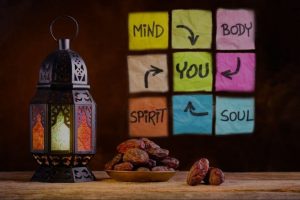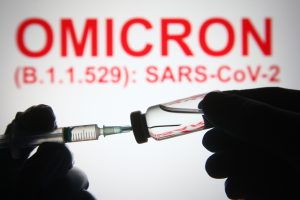
Professor Amtul Razzaq Carmichael MD
This year, the Holy month of Ramadan has arrived during the disease pandemic COVID-19 caused by SARS-CoV-2 (severe acute respiratory syndrome coronavirus 2). Over 2 billion Muslims may be fasting during this month from dawn to dusk and in some countries, the fasting hours may extend between 14 to 18 hours. How should Muslims approach fasting during this once in a century pandemic to ensure they remain safe and healthy?
The Centre of Evidence-Based Medicine in Oxford recently published that the presence of the current COVID-19 pandemic is not a contraindication to fasting in healthy individuals who do not have any symptoms suggestive of COVID-19, such as muscle pain, fever and sore throat (1). Fasting in the religious and non-religious setting has shown to have many health benefits. The scientific evidence suggests that diets that mimic fasting can have a potential beneficial effect on the risk of ageing, diabetes, cardiovascular disease, and cancer without major adverse effects (2). Hazrat Mirza Masroor Ahmad (aba), Worldwide Head of the Ahmadiyya Muslim Community, in his Friday sermon on 24/4/2020, made it clear that there is no ambiguity in Islamic teaching; people who are ill are not expected to fast and those who become ill while fasting, are enjoined to break their fast immediately.
Although there is no direct scientific research guidance on how to make the practice of fasting safer during the COVID-19 crisis, along with adhering to the national guidelines of social distancing and avoiding touching the face and eyes, there are some important factors that need consideration while fasting during the COVID-19 era.
Good Hydration
It is estimated that an average person loses 1% of their body mass during a dawn-to-dusk fast through the loss of body water. This is regarded as a small loss of body water and has no noticeable adverse effect on health (3). During the COVID-19 crisis, good hydration is encouraged during non-fasting hours (4). Replenishing body water with beverages of a high-hydration index (BHI) is a wise precaution. A high BHI means the beverages that retain more water in the body as compared to still water when drunk in the same amount. BHI depends upon the volume, energy-density, electrolyte (special salts in the body) content and the ability of the beverage to increase urine production by the body (5). When compared to still water, commercially available oral rehydration solutions such as ORS and milk (full fat and skimmed) have a high BHI. Therefore, consuming water and milk during the non-fasting hours might be a practical way of keeping the body hydrated during the month of Ramadan. The commercially available processed sugary drinks (cola/soda) and coffee, hydrate the body less than water and fruit juices are not better than water in rehydrating the body.
Different people have different hydration requirements, therefore observing the colour of the urine during the fasting hours is a useful indicator of the state of hydration (6). By looking at the colour of urine during the fasting period, it may be possible to adjust beverage requirements during the non-fasting part of the day. Passing pale yellow urine during fasting is desirable, it is possible that towards the timing of sunset, the colour of urine may turn bright yellow because of mild dehydration. However, this is not harmful to health if adequate fluids are consumed during the non-fasting hours. On the other hand, passing deep amber or brown urine is a sign of severe dehydration, this can be detrimental to health and an indication to seek medical advice.
To maintain adequate hydration, it is a wise precaution to consume a diet rich in fruits and vegetables during the non-fasting hours of Ramadan, such as cucumber, spinach, lettuce, tomato, oranges, melons, apples, peaches, strawberry and watermelon. While adding to daily water intake to ensure good hydration before starting the fast, fruit and vegetables replenish vitamins, minerals, and fibre (7), (8). As salty food can lead to thirst, it is advisable to limit the intake of salty food, while fasting during the COVID-19 pandemic. The traditional dishes such as Pakora and Samosa are flavoursome, but if consumed in large quantities, these fried, salty foods can increase dehydration.
Adequate Nutrition and a Healthy Immune System
A healthy immune system is developed and maintained on adequate nutrition. When fasting during the current pandemic, it is important to maintain a good nutritional state with an adequate intake of vitamins and micronutrients that are vital for the immune system. A wealth of mechanistic and clinical data show that vitamins, including vitamins A, B6, B12, C, D, E, and folate; trace elements, including zinc, iron, selenium, magnesium, and copper; and the omega-3 fatty acids play important and complementary roles in supporting the immune system. A balanced diet of meat, fish, milk, fruit and vegetables can help maintain the level of these vital substances in the body (9). Daily supplementation of vitamin D is reported to decrease the risk of acute respiratory tract infections (9).
There are several diets that include intermittent fasting, which have been tried by millions of people worldwide. A review of intermittent fasting diets published in the New England Journal of Surgery in February 2020, reported many health benefits of intermittent fasting for many health conditions, such as obesity, diabetes mellitus, cardiovascular disease, cancers, and neurologic disorders (10). These beneficial effects of intermittent fasting involve metabolic switching and cellular stress resistance. A recent review of the link between intermittent fasting and immunity in Ramadan found no detrimental effects of fasting on health that can be attributed to dehydration, but the review did not include any studies with COVID-19 patients (11). On the other hand, there is some evidence to suggest that a period of fasting may boost the immune system. The evidence from the scientific experiments of diets mimicking fasts suggest that fasting can activate the bone marrow to provide healthy immune cells. After a short period of fasting, damaged immune cells are removed and with re-feeding, new healthy immune cells are produced. The human body has highly sophisticated repair and regenerative systems that remain inactive in individuals who do not practice a sustained period of fast (12).
Use of Tobacco
Interim guidance published in April 2020 regarding Safe Ramadan practices in the context of the COVID-19 advises against the use of tobacco especially during Ramadan and the COVID-19 pandemic. When smoking cigarettes, the fingers (and possibly contaminated cigarettes) touch the lips, which increases the likelihood of the virus entering the respiratory system. Shared mouthpieces and hoses, when smoking tobacco by waterpipes, can facilitate the transmission of the virus (7).
The appropriate precautions of maintaining a good level of hydration and nutrition to support a healthy immune system can facilitate safe fasting practices during the month of Ramadan. To abstain from food and drink from sunrise to sunset during this epidemic is a matter of personal judgement based on God-fearing righteousness. In his Friday sermon, Hazrat Mirza Masroor Ahmad (aba), Worldwide Head of the Ahmadiyya Muslim Community advised, “… in the current circumstances, everyone should assess their own conditions and their health and seek a decision based on their own conscious as to how they need to take care of their health.” It is an individual choice for a Muslim to assess his/her personal risk of fasting during this pandemic and decide “to fast or not to fast”. We need to be mindful that we will be held to account for our decision by the All-Knowing God, Who is fully aware of our true intentions. May Allah the Almighty bring a swift end to the pandemic and bestow His mercy upon the world. Ameen.
Professor Amtul Razzaq Carmichael MD, FRCS (Gen Surg), MBBS, is a consultant. She qualified in 1987 with gold medals for academic Excellence and undertook her surgical training at major teaching hospitals in London, Edinburgh and Philadelphia. She has authored many articles for major peer reviewed scientific journals. She is a senior member of The Review of Religions Editorial Board as well as Assistant Manager.
1. Is it safe for patients with COVID-19 to fast in Ramadan? [Internet]. CEBM. [cited 2020 Apr 24]. Available from: https://www.cebm.net/covid-19/is-it-safe-for-patients-with-covid-19-to-fast-in-ramadan/
2. Brandhorst S, Choi IY, Wei M, Cheng CW, Sedrakyan S, Navarrete G, et al. A Periodic Diet that Mimics Fasting Promotes Multi-System Regeneration, Enhanced Cognitive Performance, and Healthspan. Cell Metab. 2015 Jul 7;22(1):86–99.
3. Maughan RJ, Shirreffs SM. Hydration and performance during Ramadan. J Sports Sci. 2012;30 Suppl 1:S33-41.
4. Hosseini Zijoud SR, Jalali Farahani A. Ramadan coincides with the Covid-19 pandemic: What should be done? Disaster Med Public Health Prep. 2020 Apr 22;1–4.
5. Oliver S. Development of a hydration index: a randomized trial to assess the potential of different beverages to. Nutr Hosp. 2015 Dec 2;(2):7–7.
6. ACE – ProSourceTM: April 2016 – The Newest Index on the Block: The Hydration Index [Internet]. [cited 2020 Apr 25]. Available from: https://www.acefitness.org/education-and-resources/professional/prosource/april-2016/5855/the-newest-index-on-the-block-the-hydration-index/
7. WHO-2019-nCoV-Ramadan-2020.1-eng.pdf [Internet]. [cited 2020 Apr 24]. Available from: https://apps.who.int/iris/bitstream/handle/10665/331767/WHO-2019-nCoV-Ramadan-2020.1-eng.pdf?sequence=1&isAllowed=y
8. The top 20 most hydrating foods [Internet]. [cited 2020 Apr 25]. Available from: https://www.medicalnewstoday.com/articles/325958
9. Calder PC, Carr AC, Gombart AF, Eggersdorfer M. Optimal Nutritional Status for a Well-Functioning Immune System Is an Important Factor to Protect against Viral Infections. Nutrients. 2020 Apr;12(4):1181.
10. de Cabo R, Mattson MP. Effects of Intermittent Fasting on Health, Aging, and Disease. Longo DL, editor. N Engl J Med. 2019 Dec 26;381(26):2541–51.
11. (PDF) Ramadan intermittent fasting and immunity: An important topic in the era of COVID-19 [Internet]. ResearchGate. [cited 2020 Apr 24]. Available from: https://www.researchgate.net/publication/340731759_Ramadan_intermittent_fasting_and_immunity_An_important_topic_in_the_era_of_COVID-19
12. Choi IY, Lee C, Longo VD. Nutrition and fasting mimicking diets in the prevention and treatment of autoimmune diseases and immunosenescence. Mol Cell Endocrinol. 2017 Nov 5;455:4–12.




Add Comment